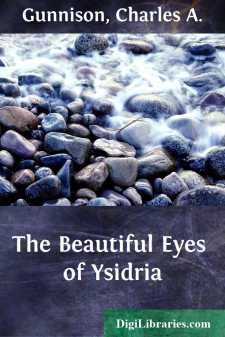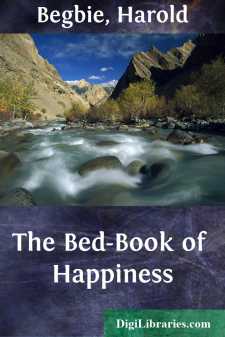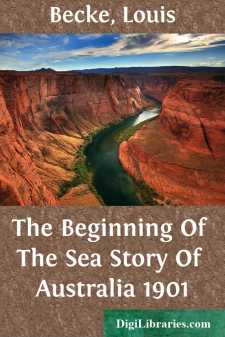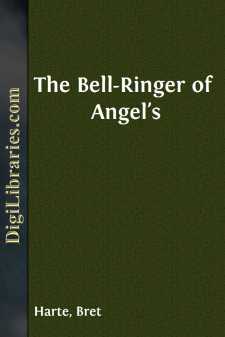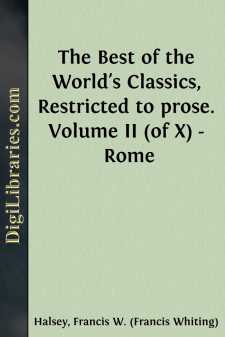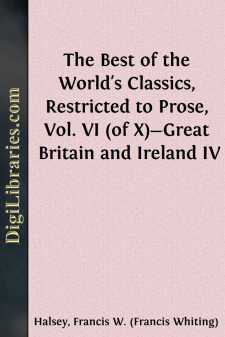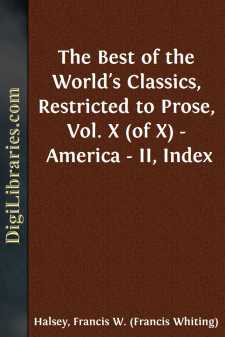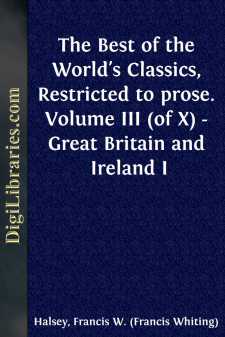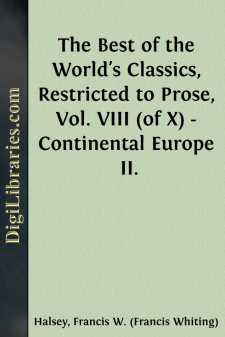Literary Collections
- American 84
- Ancient, Classical & Medieval 14
- Asian 1
- Australian & Oceanian 1
- Canadian 55
- Continental European 121
- English, Irish, Scottish, Welsh 179
- Essays 160
- General 24
- Letters 46
- Middle Eastern 1
Literary Collections Books
Sort by:
by:
Henry Morley
Jonathan Swift was born in 1667, on the 30th of November. His father was a Jonathan Swift, sixth of the ten sons of the Rev. Thomas Swift, vicar of Goodrich, near Ross, in Herefordshire, who had married Elizabeth Dryden, niece to the poet Dryden’s grandfather. Jonathan Swift married, at Leicester, Abigail Erick, or Herrick, who was of the family that had given to England Robert Herrick, the...
more...
Have you seen the magnificent slope of our beloved Tamalpais, as it curves from the changing colour of the bay, till touching the fleecy fog rolling in from the Pacific, it passes from day to rest? If you have not, I hope you may, for the sooner you have this glorious picture on your memory's walls, the brighter will be your future, and you will have a bit of beauty which need not be forgotten...
more...
by:
Harold Begbie
THE BED-BOOK OF HAPPINESS THEISSE[Sidenote: Richter] In his seventy-second year his face is a thanksgiving for his former life, and a love-letter to all mankind. RICHTER[Sidenote: Carlyle] We have heard that he was a man universally loved, as well as honoured … a friendly, true, and high-minded man; copious in speech, which was full of grave, genuine humour; contented with simple people and simple...
more...
by:
Louis Becke
To many people in England the mention of Australia conjures pictures of tented gold-fields and tall, black-bearded, red-shirted bushrangers; of mounted police recruited from "flaxen-haired younger sons of good old English families, well-groomed and typically Anglo-Saxon"; of squatters and sheep runs; of buckjumpers ridden by the most daring riders in the world; and of much more to the same...
more...
by:
Bret Harte
CHAPTER I. Where the North Fork of the Stanislaus River begins to lose its youthful grace, vigor, and agility, and broadens more maturely into the plain, there is a little promontory which at certain high stages of water lies like a small island in the stream. To the strongly-marked heroics of Sierran landscape it contrasts a singular, pastoral calm. White and gray mosses from the overhanging rocks and...
more...
CATO, THE CENSOR Born in Tusculum, Italy, in 234 b.c., died in 149; celebrated as statesman, general, and writer; questor under Scipio in 204; Consul in 195; served in Spain in 194; censor in 184; ambassador to Carthage in 150; one of the chief instigators of the third Punic war; among his writings are "De Re Rustica" and "Origines." OF WORK ON A ROMAN FARM When the owner of the farm...
more...
THE BEGINNINGS OF TRACTARIANISM During the first years of my residence at Oriel, tho proud of my college, I was not quite at home there. I was very much alone, and I used often to take my daily walk by myself. I recollect once meeting Dr. Copleston, then Provost, with one of the Fellows. He turned round, and with the kind courteousness which sat so well on him, made me a bow and said, Nunquam minus...
more...
The cemetery of Père Lachaise is the Westminster Abbey of Paris. Both are the dwellings of the dead; but in one they repose in green alleys and beneath the open sky—in the other their resting place is in the shadowy aisle and beneath the dim arches of an ancient abbey. One is a temple of nature; the other a temple of art. In one the soft melancholy of the scene is rendered still more touching by the...
more...
RICHARD DE BURY Born in 1281, died in 1345; the son of Sir Richard Aungerville, his own name being taken from his birthplace, Bury St. Edmonds; educated at Oxford, and became a Benedictine monk; tutor to Edward III; dean of Wells Cathedral in 1333; bishop of Durham the same year; high chancellor of England in 1334; founded a library at Oxford; his "Philobiblon" first printed at Cologne in 1473....
more...
THE TYRANNY OF THE AMERICAN MAJORITY I hold it to be an impious and execrable maxim that, politically speaking, the people has a right to do whatever it pleases; and yet I have asserted that all authority originates in the will of the majority. Am I then in contradiction with myself? A general law, which bears the name of justice, has been made and sanctioned not only by a majority of this or that...
more...



